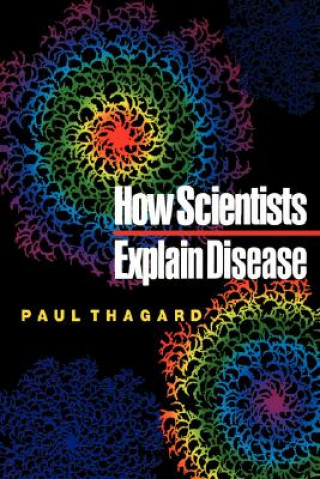
Kod: 04639991
How Scientists Explain Disease
Autor Paul Thagard
How do scientists develop new explanations of disease? How do those explanations become accepted as true? And how does medical diagnosis change when physicians are confronted with new scientific evidence? These are some of the que ... więcej
- Język:
 Angielski
Angielski - Oprawa: Miękka
- Liczba stron: 268
Wydawca: Princeton University Press, 2000
- Więcej informacji o książce

Zobacz książki o podobnej tematyce
-

The Star Wars Archives. 1977-1983. 40th Ed.
125.55 zł -5 % -

Gilead
48.92 zł -14 % -

Marx and Marxism
61.21 zł -15 % -

The Norton Anthology of World Literature
529.20 zł -

Spiritual Friendship
93.83 zł -1 % -

Marks of Excellence
238.62 zł -

Rad American Women A-Z Postcards
62.82 zł -10 %
Bon podarunkowy: Radość gwarantowana
- Podaruj bon o dowolnej wartości, a my się zajmiemy resztą.
- Bon podarunkowy dotyczy całej naszej oferty.
- Możesz wydrukować elektroniczny bon z e-maila a następnie przekazać go obdarowanemu.
- Ważność bonu wynosi 12 miesięcy od daty wystawienia.
Więcej informacji o How Scientists Explain Disease
Za ten zakup dostaniesz 161 punkty
 Opis
Opis
How do scientists develop new explanations of disease? How do those explanations become accepted as true? And how does medical diagnosis change when physicians are confronted with new scientific evidence? These are some of the questions that Paul Thagard pursues in this pathbreaking book that develops a new, integrative approach to the study of science. Ranging through the history of medicine, from the Hippocratic theory of humors to modern explanations of Mad Cow Disease and chronic fatigue syndrome, Thagard analyzes the development and acceptance of scientific ideas. At the heart of the book is a case study of the recent dramatic shift in medical understanding of peptic ulcers, most of which are now believed to be caused by infection by the bacterium Helicobacter pylori. When this explanation was first proposed in 1983, it was greeted with intense skepticism by most medical experts, but it became widely accepted over the next decade. Thagard discusses the psychological processes of discovery and acceptance, the physical processes involving instruments and experiments, and the social processes of collaboration, communication, and consensus that brought about this transformation in medical knowledge. How Scientists Explain Disease challenges both traditional philosophy of science, which has viewed science as largely a matter of logic, and contemporary science studies that view science as largely a matter of power. Drawing on theories of distributed computing and artificial intelligence, Paul Thagard develops new models that make sense of scientific change as a complex system of cognitive, social, and physical interactions. This is a book that will appeal to all readers with an interest in the development of science and medicine. It combines an engaging style, significant research, and a powerfully original argument.
 Szczegóły książki
Szczegóły książki
Kategoria Książki po angielsku Medicine Clinical & internal medicine Diseases & disorders
276.07 zł
- Pełny tytuł: How Scientists Explain Disease
- Autor: Paul Thagard
- Język:
 Angielski
Angielski - Oprawa: Miękka
- Liczba stron: 268
- EAN: 9780691050836
- ISBN: 069105083X
- ID: 04639991
- Wydawca: Princeton University Press
- Waga: 397 g
- Wymiary: 235 × 152 × 15 mm
- Data wydania: 10. July 2000
Ulubione w innej kategorii
-

Healing Add
85.77 zł -4 % -

Radical Remission
81.65 zł -5 % -

Cancer as a Metabolic Disease - On the Origin, Management, and Prevention of Cancer
769.33 zł -

Palliative Radiation Oncology
1235.11 zł -

Roitt's Essential Immunology 13e
290.27 zł -

Infectious Diseases: A Clinical Short Course
451.27 zł -

CT Anatomy for Radiotherapy
409.78 zł -

Bethesda Handbook of Clinical Oncology
343.63 zł -3 % -

How to Starve Cancer
109.44 zł -5 % -

Comprehensive Review of Infectious Diseases
577.73 zł -8 % -

Spillover
53.56 zł -10 % -

Healing Lyme Disease Coinfections
85.47 zł -4 % -

Allergic to Life
184.45 zł -5 % -

Immunology Guidebook
1156.78 zł -

Cardio-Oncology
480.77 zł -

Schaum's Outline of Immunology
132.29 zł -3 % -

Emperor of All Maladies
57.68 zł -15 % -

Natural Treatments for Lyme Coinfections
85.47 zł -4 % -

Oxford Handbook of Clinical Immunology and Allergy
159.38 zł -14 % -

Musculoskeletal Imaging
458.11 zł -9 % -

Graphic Guide to Infectious Disease
255.83 zł -

Health and Disease Begin in the Colon
224.42 zł -

Oxford Handbook of Infectious Diseases and Microbiology
210.02 zł -4 % -

TNM Classification of Malignant Tumours 8e
221.80 zł -3 % -

Cancer and the New Biology of Water
105.51 zł -4 % -

Basic Immunology
290.67 zł -6 % -

Autoimmune Solution
51.84 zł -23 % -

p53
58.89 zł -19 % -

Lanzkowsky's Manual of Pediatric Hematology and Oncology
943.32 zł -

Principles of Gynecologic Oncology Surgery
1571.70 zł -

Radiation Oncology Management Decisions
511.68 zł -2 % -

Netter's Infectious Diseases
403.54 zł -

Atlas of Multiparametric Prostate MRI
862.87 zł -

Vaccine Race
51.84 zł -23 % -

Complete Guide to Breast Cancer
79.43 zł -23 % -

Color Atlas of Immunology
94.33 zł -8 % -

Compatibility Gene
51.84 zł -23 % -

Key to Self-Liberation
397 zł -

Handbook of Breast MRI
509.46 zł -

Dermatoscopy of Non-Pigmented Skin Tumors
1017.02 zł -

Breast Ultrasound
404.95 zł -

Manson's Tropical Diseases
1292.90 zł -

Abeloff's Clinical Oncology
1955.72 zł -

Clinical Physiology of Acid-Base and Electrolyte Disorders
516.51 zł -

Atlas of Breast Surgery
1273.37 zł -

Cardio-Oncology Practice Manual: A Companion to Braunwald's Heart Disease
719.49 zł -

Illustrated Anatomical Segmentectomy for Lung Cancer
767.32 zł -

Nanomedicine for Cancer Diagnosis and Therapy
1020.04 zł -

Chemotherapy Protocols and Infusion Sequence
480.77 zł
zadowolonych klientów
Od roku 2008 obsłużyliśmy wielu miłośników książek, ale dla nas każdy był tym wyjątkowym.
Copyright! ©2008-24 libristo.pl Wszelkie prawa zastrzeżonePrywatnieCookies



 21 milionów książek
21 milionów książek Dostawa 10.99 zł
Dostawa 10.99 zł (32) 444 93 66 (8-15.30h)
(32) 444 93 66 (8-15.30h)